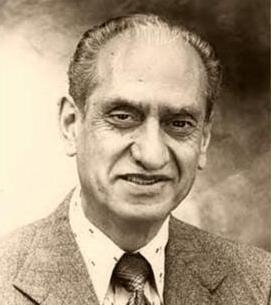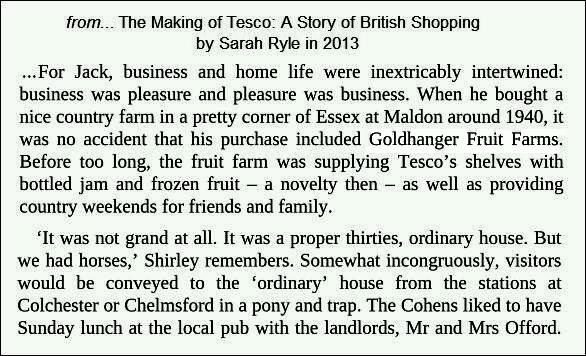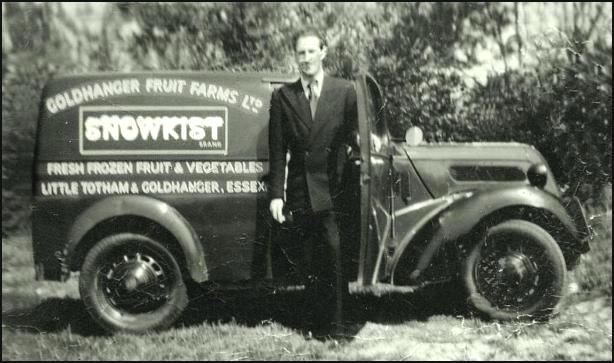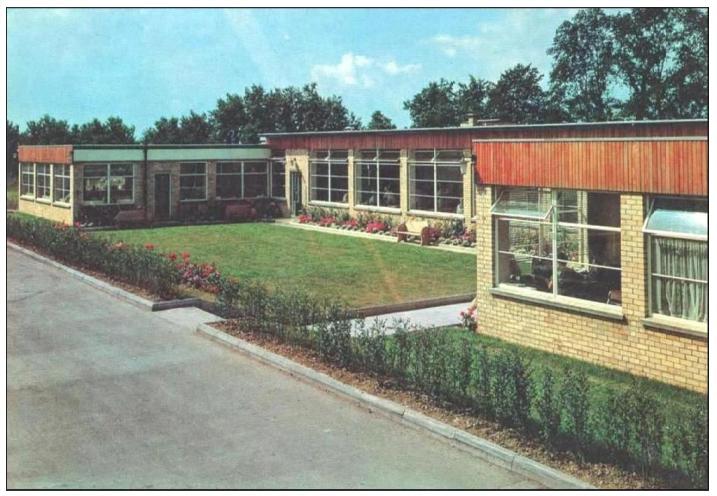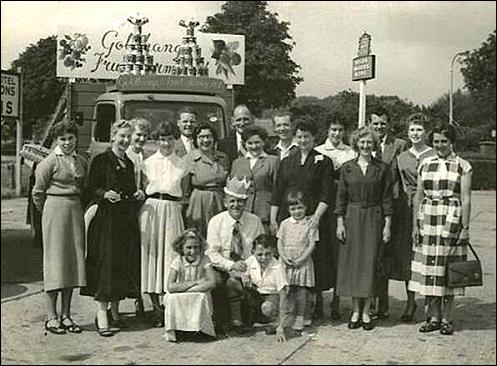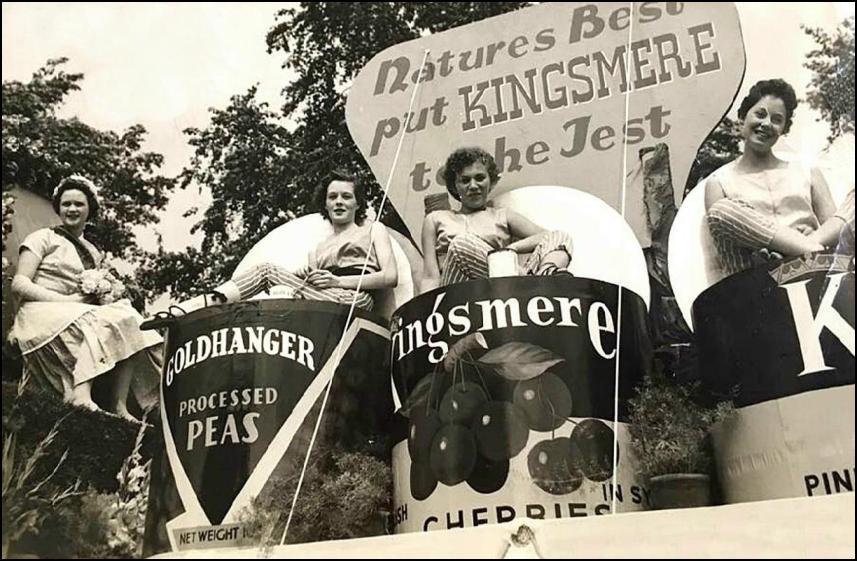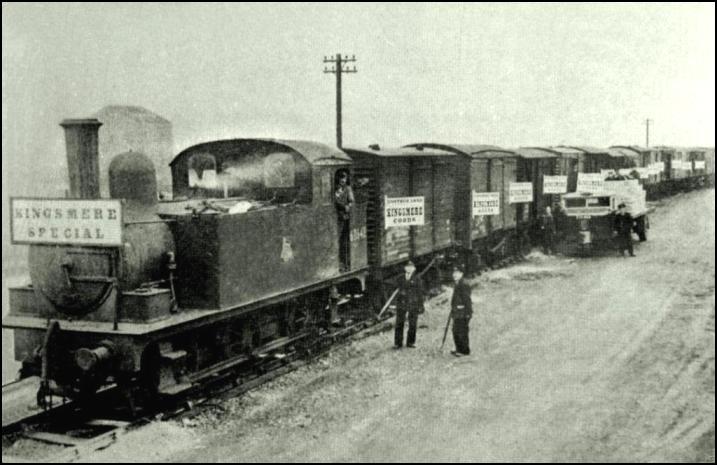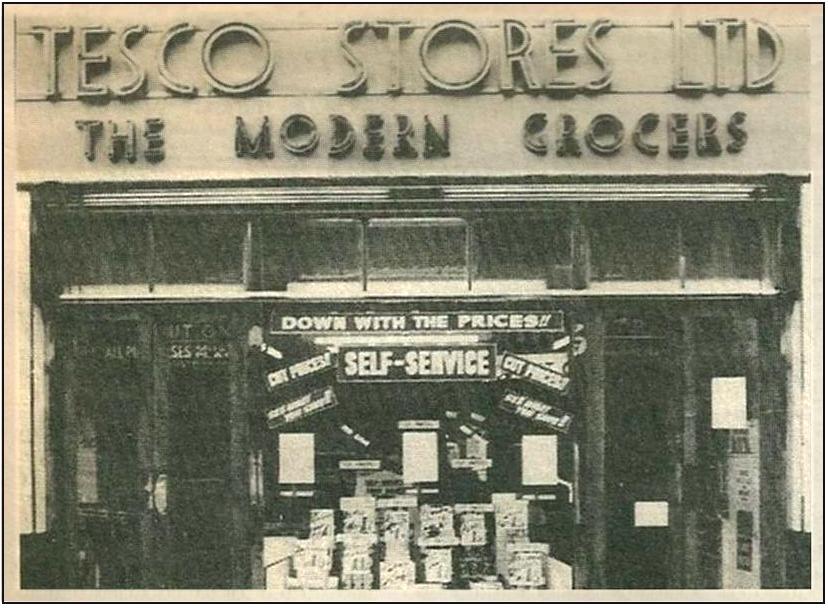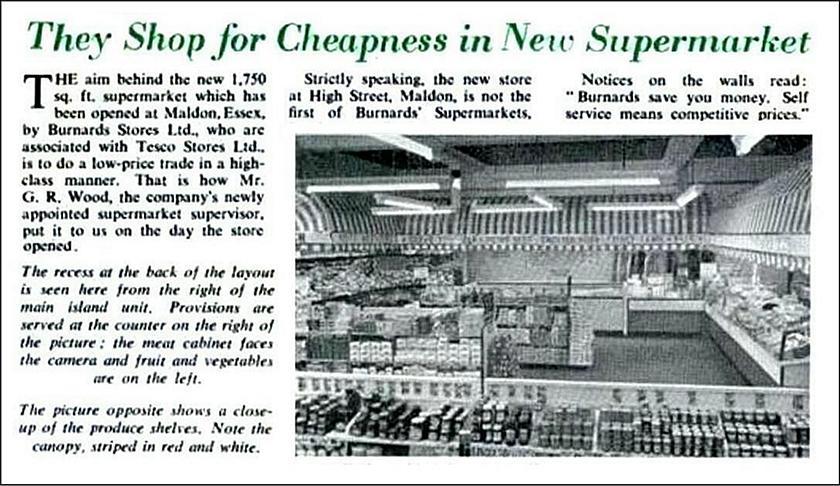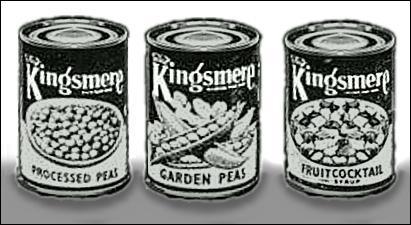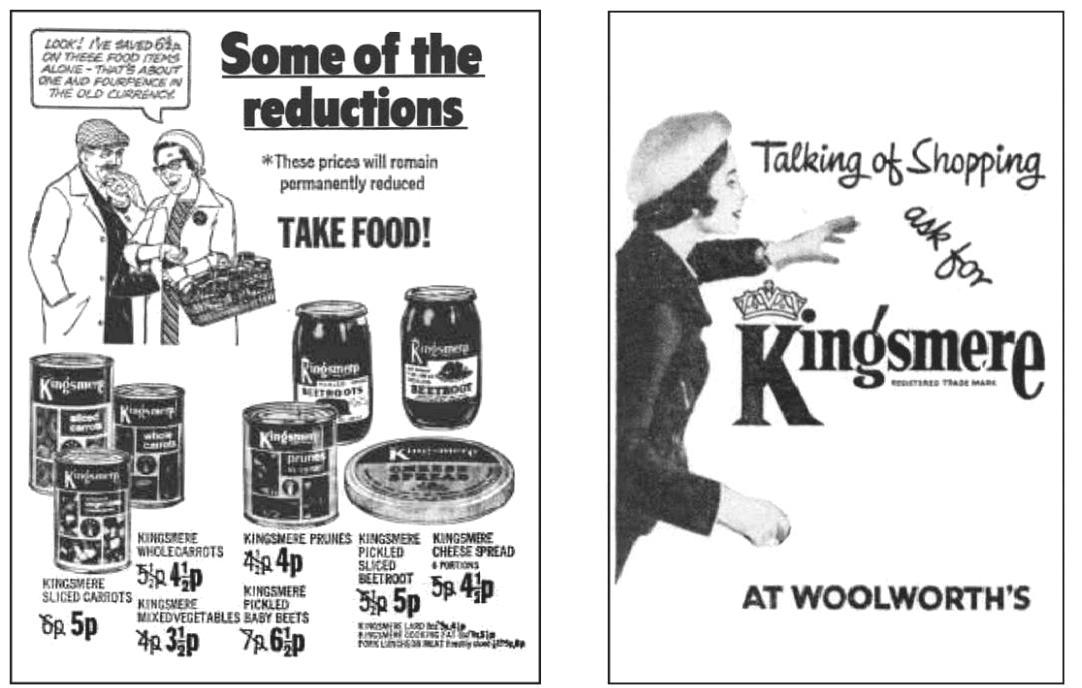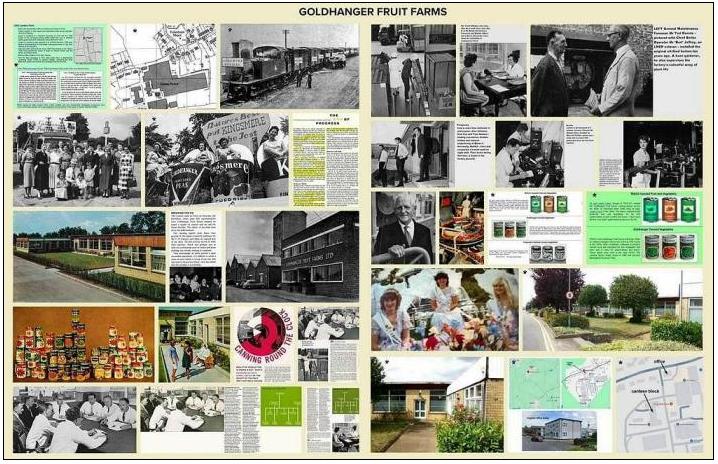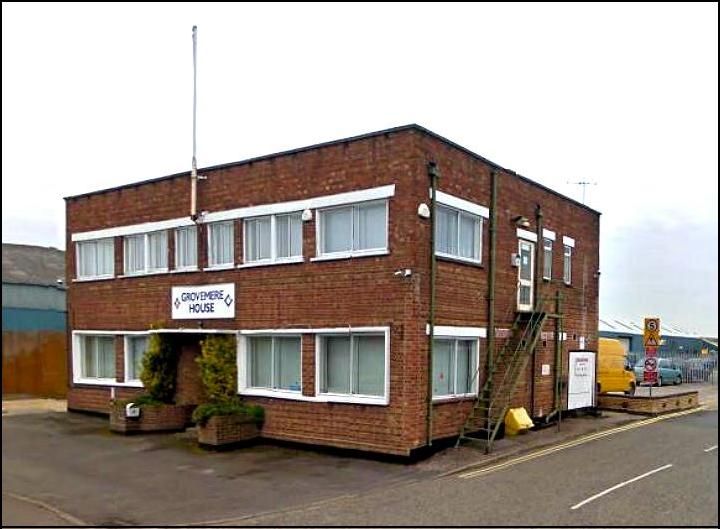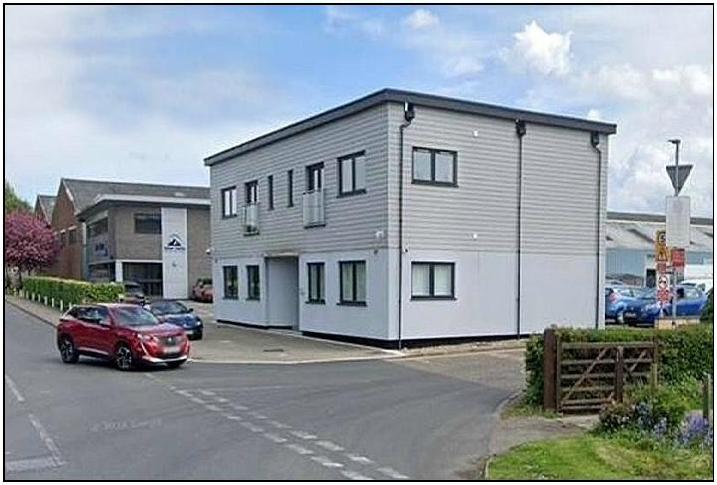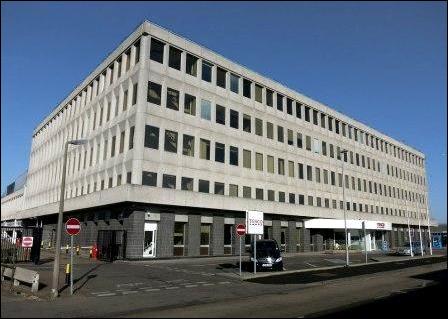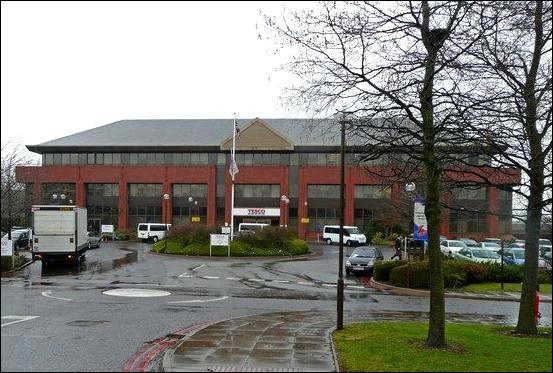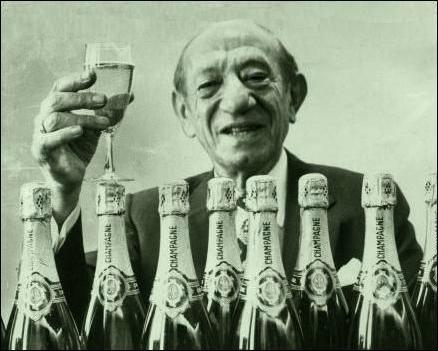|
Sir John (Jack) Cohen founder of
the TESCO supermarket chain and a past owner of Lt London Farm |
|||
|
Jacob Kohen |
Jack Cohen |
||
|
In 1940, concern for the
safety of his children in London, food shortages, rationing, and the 'Dig for
Victory' campaign persuaded Jack Cohen to purchase Little
London Farm (within Goldhanger Parish boundary) and used it as a family
retreat and to extend his London based business activities, which he did well
into the 1950s. During that period he created and developed a canning factory
in Tolleshunt Major which he named Goldhanger
Fruit Farms. Later he opened his first purpose-built supermarket in
Maldon High Street. Here is a summary of his
career and activities relating to Goldhanger... |
|||
|
1898 - Jacob Edward Kohen was
born in London 1917 - he served in the Royal
Flying Corp for two years 1919 - created his first grocery stall in
Hackney using surplus NAAFI stock 1924 - The TESCO brand was launched 1930s - he changed his name to John Edward Cohen but was
always known as Jack 1940 - Cohen bought Little London Farm 1942 - he bought Longs, Hill and Little Renters
Farms in Tolleshunt Major 1944 - He founded Goldhanger Fruit Farms company at Hill Farm in T-Major 1946 - Cohen helped fund the building of the Goldhanger British Legion Hall 1947 - The UKs first cold store was built at
Goldhanger Fruit Farms 1948ish - The SnowKist brand of frozen fruit & vegetables was
registered 1950s - The peak staff level was
recorded as 300 personnel 1950s - Created “Kingsmere”
cannned products and sold the label to Woolworths 1950s - “Kingsmere” products
were taken to Maldon East Goods yard 1956 - His first purpose-built supermarket was
constructed and opened in Maldon High St 1958 - TESCO sold Goldhanger Fruit Farms to
Cadbury-Sweppes 1960 - Goldhanger Fruit Farms merged with Express Dairy Group 1969 - Cohen retired as chairman of Tesco and
was knighted for services to retailing 1970s - Cadbury-Sweppes sold GFF to TKM Foods 1979 - Jack Cohen died aged 81 1980s - Goldhanger Fruit Farms closed down, the site was
re-named Beckingham Business Park |
|||
|
Lt London Farm in the 1950s with TESCO staff and the Cohen family (seated in the middle) |
|||
|
|
|||
|
below are extracts from the authorised biography of Sir Jack Cohen
written by M Corina in 1972 ( bold phases have been added only to this webpage) Pile it High, Sell it Cheap and the chapter entitled Goldhanger ...The combination of Jack's interest in his nursery
venture and the desire to be with the children during the war-time years led
him naturally into farming. When the town-bred grocer found himself torn
between the desires to relax in the countryside and to see his children,
these were reconciled not by any calculated action but by another of those
unexpected opportunities that come to gregarious friendly men. Just as a
telephone call from a bank manager took him to Cheshunt, so another call from
a salesman friend, Mr Matchen, introduced him to a Major Frost and took him
to farmland fringing the east coast marshes near the Heywood Basin(sic) near
Maldon. ...Shortages of foodstuffs had resulted in a national
campaign to 'Dig for Victory'. Allotments were springing up on every spare
piece of land. Jack was becoming bored by restricted business, or so it
seemed. After all, there seemed little skill required in running shops
stocked by goods generally supplied on allocations worked out by Ministry of
Food officials. Rationing made the art of selling mechanical and uninspired.
The nursery project had aroused his enthusiasm and he liked the prospect of
becoming a farmer as well as a market gardener. Perhaps he could build a country
home and give his girls some happy hours in the freedom of Essex acres. ...Major Frost turned out to be a friend of Mr Matchen, formerly a
representative for the American canning giant Armour, but now an agent for a
Maldon milling firm, E. J. Baker. Jack's own small involvement in the north
of Cheshunt, was to help him move sideways, across to the Essex coast, in
response to advice from Major Frost on land for sale. The and turned out to
be a thirty acre fruit farm on the outskirts
of Goldhanger village. It was
called Little London, but known to the local population as the '13.X. Ranch'. Jack visited Little London Farm and scanned row upon row
of fruit trees. By a process of calculating the number of trees about 8,000 -
and then assessing the value of each by the wholesale value of a crop of
apples, Jack arrived at a purchase price equal to 10s. per tree, ₤4,000
for the whole farm. The offer was accepted. It was several days before he
came down to earth and fully realized what he had bought. He now had to face
the reality of running a fruit farm at a time of war-time restrictions. At first Cissie was reluctant to accept Jack's idea of a
country retreat, but soon she found herself drawn into his planning, agreeing
to the conversion of the farmhouse, with the aid of a war damage claim, into
a replica of their Chessington Avenue home, down to the outside first-floor
veranda. As the house went up, her enthusiasm was also aroused. Jack built a
tennis court, and added a bowling green to the lawns. Landscaped and Snow-cemmed,
it offered four bedrooms to accommodate friends and relations for rural
weekends. . . .Two farms came up for sale in the adjoining village
of Tolleshunt Major, Longs Farm and
Hill Farm, with an area of just over three
hundred acres. Jack bought them at ₤50 per acre. Denny moved into Longs
Farm and proceeded to take Jack into arable farming. Shortly afterwards, a
local auction offered the chance to buy Little Renters Farm, near Little Totham, with no competing bidder, to take his land holdings to
over four hundred acres. Into Little Renters went a young couple called
Ernest and Dora Seaborn, and the Cohen family occupied Little London at
weekends and holidays. Seaborn introduced Jack to a new world, bringing in
cattle, heifers, pigs, turkeys, and chickens. The farmhouse teas at Little
London, always available when the Cohen family arrived thirsty and hungry
from war-torn London, began many happy weekend hours, with the girls learning
to ride on the team of six horses kept by Seaborn, an expert horseman who
also tutored Cissie in the use of a pony and trap. One regular visitor to the
farms was a good-looking young Royal Artillery sergeant called Hyman
Kreitman, the steady boyfriend of Jack's cider daughter, Irene. Hyman
frequently joined the family for their country weekends and was captivated by
Irene. A large pipe-smoking enigmatic man, he gives little away.
Creative and cultured, he had become embroiled in the world of Jack Cohen by
accident - a minor riding accident, falling off a horse at the Selsdon Park
Hotel while on leave. He was tended by a sympathetic Irene Cohen, also
staying at the hotel with her parents. The two became inseparable, courting at Goldhanger, and finally marrying. When he met Irene, his elegant
manner was a badge of membership in a well-to-do family. Hyman, youngest of
five sons of a successful London footwear manufacturer, was courteous and
calm. Jack was immediately attracted to him. . . .Close to Hill Farm, and fronted by an old thatched
house and old cowshed, was The Bell, an unspoilt rural public house where Jack and Cissie
would buy one-and-sixpenny barside meals and talk over plans for developing
the farms as a coordinated unit. Without the day-to-day pressures of retailing,
it was pure bliss for Jack to apply his mind to framing an agricultural
policy. For the first few years, fifty per cent of the acreage was devoted to
cereals and root crops, twenty per cent to pasture and thirty per cent to
soft fruit and apples; but Jack could not resist the temptation to apply his
weekday business techniques, and it was the fruit that interested him most of
all as the most profitable if most speculative of all the crops. The family
enjoyed country life - Cissie and Shirley would drive back and forth in the
trap, going into Maldon for
the shopping. And it was now that Jack reached a
decision to become a major fruit farmer. Once again Bernard Lazarus formed a
company - Goldhanger Fruit
Farms - with a ₤100 nominal capital,
in 1944. Jack's first fruit produce came from the orchards of Little London. Then he began to plant soft fruits such as strawberries,
blackcurrants and loganberries. Water was a constant problem. There was a lot
of laughter at the sight of Hyman Kreitman with a hazel twig trying (in the
end successfully) to divine water, so that a well could be sunk. The
energetic Hyman also did his share of hedging and ditching, and went to
market to buy pigs. . . .As the war in Europe came to its close, the
Goldhanger fruit venture still occupied much of Jack's time. Rationing and
re-strictions were still holding Tesco's development in check, and the main
business ticked over. When Hyman married Irene, his enthusiasm for the farms
buoyed up Jack, anxious to expand his country interests and always having
difficulty in cultivating the patience of farmers, who think in weeks and
seasons rather than minutes and hours. It was the beginning of a long and
astonishing business as well as a family partnership. Both men came to
realize that it was all very well to plant lots of soft fruit that they would
have no difficulty in selling, but the problem was how to preserve the crop
for marketing and how to pick the fruit. The answer was to convert Hill Farm into a cold store and the outbuildings into storage and production areas. The cowshed became a jam factory. . . .Central to the farm development plan was the cold
store, for which an old barn had been earmarked. Plate freezing equip-ment
was ordered from a Scottish engineering firm, Weir's of Glasgow, and was
ready for action by June 1947. Extra out-buildings were needed, mainly to
accommodate twenty girl fruit-pickers hired in answer to an advertisement in
a London evening newspaper that promised a working holiday in the country.
Once again Jack's resourcefulness paid off. The end of a war meant surplus
defence equipment, and Jack bought three large, rather rusty Nissen huts from a Royal Naval
base near Burnham-on-Crouch.
The ex-naval huts were being erected piece by piece under a building licence
as the first girls arrived to pick the crop, mainly strawberries. Some of the
earliest arrivals had to be accommodated in the barns at Little London while
a team, including Ernest Seaborn's two sons, Donald and Peter, worked
frantically to erect the billets on concrete bases for the pickers. Well over
₤10,000 had been invested by Jack in the fruits enterprise and between
June and September 1947 he had cause for second thoughts. Jack was no established manufacturer with research
facilities, and yet he was ahead of his time - as usual - in trying to
develop a frozen foods business. During the first year the freezing plant did
not operate at all, and as the baskets of fruit poured in from the fields, a
jam-boiling pan installed in the corner of the old cowshed, now cleaned and
converted to meet sanitary laws, had to go into twenty-four-hour action.
Lorries brought in case after case of glass jars as the factory worked around
the clock filling thousands of pots of jam. What was being lost on the swings
was gained on the roundabouts, but Jack looked rueful whenever he saw a pile
of cartons labelled "Snowkist", a brand he had registered for
quick-frozen fruit. The local authority added to the problems by raising
unexpected planning objections to the use of zoned agricultural land for
manufacturing purposes.
. . .The following summer saw changes. Local labour was used
and Goldhangcr Fruit Farms engaged a small office staff, led by W. C. Hooper,
with Frank Foster as foreman and Marie Martin in charge of the fruit-picking.
Foster and Miss Martin were to marry and some of the girls brought from
London were to wed local farm staff. Jack recalls: The next three years were an uphill struggle with many, many
problems but we saw our baby grow and develop strongly in all departments. We
installed an expert jam-maker, and in this field we excelled, although it was
on the canning side that we were ultimately to be most successful. With a
fleet of old Albions we built up a net-work of distribution throughout
England and Wales, and with the aid of the then British Road Services we put
the name of Goldhanger Fruit Farms on the map. The drivers took up to eighty to ninety deliveries a
week to customers all over the country.
We built up a fleet of
ancient buses to transport our increasing labour force, in which field we had to move out to surrounding villages. Our
canning activities embraced many local farmers by now and peas were brought
into the factory on the vine to be threshed. They were paid for by net weight
which was a more profitable outlet for them. In this period we laid the
foundation for the expansion of all departments and our building programme
provided many a headache for Ted Dennis, who eventually took over from the
contracting builders. The old Army huts disappeared, indeed one of them went
up in smoke one evening while the staff were still there. This contained mainly
cartons - fortunately all our documents were rescued. By the summer of 1951 our labour force at its peak, including
casual workers, had risen to over three hundred. In these few years we had
achieved far more than we had dared hope. A new team was formed under Ken
Harradence as general manager, new offices were built and we began to produce
more and more brands. Goldhanger Fruit Farms were here to stay. In 1958 I felt after consultation with Hyman that our baby had grown up
and there were fresh fields to conquer. I reluctantly said goodbye to the factory and farms. What Jack omits in his recollection is his astonishing
anticipation of future developments. Not only was he one of the first to try
quick freezing of fruit and, later, vegetables on a commercial scale, but the
Goldhanger factory was ahead of
later trends by supplying large quantities of own-label canned goods and
bottled jams and fruits. He had built new houses for farm staff and
created an industrial area in lush countryside. . . .The Goldhanger venture flourished in a number of
ways. One of the most important deals came after Kreitman, on holiday in
France, met by chance a Mr Vincent Smith, the biscuit buyer for F. W.
Woolworth. Kreitman seized the opportunity to talk about the canning operations
and suggested that perhaps Woolworth might be interested in taking some
supplies. An offer was made to provide some labelled samples and after
further discussion, without any commitment by Woolworth to buy, the brand
name Kingsmere (taken from a road in Wimbledon known to Mr Smith) was
decided. Today, Kingsmere
is one of Woolworth's best-known product titles, largely because Goldhanger
won an important supply contract and
even became a go-between in arranging for the same label to be used by other
canners in filling bulk orders. The sale of Goldhanger Fruit Farms came suddenly. For some
time, packing had been undertaken for the Express Dairy Company
through Mitcham Foods, and an offer to buy came when Jack was away in
Florida, via a telephone call relayed through Hyman Kreitman. He sold the
factory at a handsome profit. It was a wise move, in that Tesco at the time
was in a phase of explosive growth as a public company and Jack could not
possibly devote his attention to an essentially personal investment that had
become a substantial business enterprise. Besides, Cissie was anxious to
resume town life now that the children had grown up. The country was too
quiet for her. . . .Later, Goldhanger Fruit
Farms was bought by Schweppes, manufacturers of Chiver-Hartley preserves among other foods. Today it is part of the
Cadbury-Schweppes empire and few executives in that major food manufacturing
combine probably realize that the cannery in Essex (telegraphic address
Goldfarm) was the creation of their toughest trade customer. In July 1970, Jack and Cissic made a sentimental journey to
Goldhanger. He shook his head as he drove his pale blue Rolls-Royce round the
lanes showing the author the farms he once owned. 'Did I make a mistake,
selling up?' he kept asking. It would be easy to think so, standing in the
vast storehouse. Goldhanger is
now the largest canner of own-label fruit and vegetables in Britain. Capital investment by Schweppes, the new owners, has
exploited Jack's early ideas to the full. Some 4,800,000 cases of canned
products pour out each season bound for such prominent customers as Fine
Fare, V.G., the Co-op, Pricerite, Key Markets, F. W. Woolworth, Moores
Stores, Unigate and Express Dairy. Fruit and vegetables pour in from abroad to supplement
home-grown crops needed to keep the lines going. . . .Cissie, who placed a small carton of plump
strawberries in the boot of the Rolls before we drove away, said: "No, I
don't regret it. You can't expect those good and happy times to return by
owning something permanently. We have our memories and that's enough. I was
almost the Lady of the Manor, handing out prizes of Tesco's Banquet flour and
cake mixtures at the village fetes. Goldhanger was an interlude,
but with Jack it always has to be business, business, and more business. It
is not enough for him to have started something and taken it to the point of
success - he just wants to be more successful. " |
|||
|
the canteen and welfare
block in the early 1960s the staff in 1959
a seat in the grounds for
staff relaxation with an appropriate name
plate
a Goldhanger Fruit Farms
summer outing in the 1950s
a Goldhanger Fruit Farms
Carnival float
A “Kingsmere” special
goods train at Maldon East Station in the 1950s
Cohen’s first supermarket
was in Maldon
The first purpose-built supermarket in Maldon High St in 1956 |
|||
|
extracts from a
Cadbury-Sweppes magazine in the 1960s |
|||
|
the Goldhanger label |
the Kingsmere label |
||
|
Woolworths adverts for
Kingsmere |
|||
|
Goldhanger Fruit Farms as
portrayed on the Express Dairy Tales website at... https://expressdairytales.uk/ed-horticulture-goldhanger-fruit-farm |
|||
|
the office block in the 1980s |
the office block as it is today (2025) |
||
|
TESCOs Cheshunt, Herts HQ 1960s-90s |
The Welwyn Garden City “Campus” in recent times |
||
|
One of
the buildings at TESCOs Welwyn Garden City headquarters and Campus has been
given the name “Maldon” in
recognition of the Company’s first self-service supermarket which was opened
in the old Maldon cinema in 1956.
Sir Jack
Cohen 1898 - 1979 |
|||
.
